AudioCulture
The noisy library of New Zealand music
Te pātaka korihi o ngā puoro o Aotearoa
Avalanche City
Dave Baxter was born in the UK, but when he was six months old he emigrated to New Zealand with his parents. Baxter grew up in Tauranga until the age of 10, when he moved to Hamilton for the next 10 years. As he recounted to Tearaway magazine in 2016, Baxter was musically inclined from a young age.
“I first started playing music when I was really young. I used to pretend to play the violin on my Dad’s paint roller when I was four or five. And then I learnt violin when I was five, but I didn’t really learn it very well; I couldn’t play very well. After that I played ukulele for a little bit and then started playing guitar when I was about nine.”
In the same interview, Baxter cites US alternative metal band The Deftones as “the first kinda thing I really got into musically.” Through high school, Baxter played guitar in bands and competed in Smokefreerockquest, which gave him his first songwriting experience.
Baxter dropped out of high school to pursue a degree in commercial music at WINTEC
In his final year, Baxter dropped out of high school to pursue a degree in commercial music at WINTEC, where he majored in music production. Baxter told me that his guitar teacher encouraged this decision. “My guitar teacher wanted me to study music at WINTEC where he was a tutor. I didn’t want to do my final year at school, and he convinced my mum to let me. He’d taught a lot of people and he reckoned I’d be able to have a good music career. He actually said the words ‘international music career’ to my mum, which was enough for her.”
While studying, Baxter immersed himself in Hamilton’s hardcore scene. He played guitar for the band One Must Fall, which he described to me as “sort of like math metal with heavy breakdowns.” With One Must Fall, Baxter performed extensively in Hamilton and around New Zealand, also opening for international hardcore acts who visited the country.
It was also while studying that Baxter wrote a song called ‘Avalanche City’, the eventual inspiration for his artist name. The song was part of Baxter’s final project for his degree: writing, recording and producing an album. As Baxter did not sing at the time, his friend Luke Thompson provided vocals. “We had a rule where he wasn’t allowed to write anything until he was in front of the microphone and so we’d do a few takes of a song, he’d sing whatever came to him and I’d cut it all together and try get it to make sense,” he says. “‘Avalanche City’ was a song from that album. I really just loved the name and earmarked it at the time for a future band name. It was years later until I actually used it.”
Upon graduating, Baxter moved to Auckland and began an internship at Kog Recording Studios, eventually becoming a paid engineer and mixer there. Baxter’s job also involved writing music for TV ads, documentaries and short films. While working at Kog, he joined another hardcore band, The Chase, which had punk influences. “Simple songs and heaps of fun to play live, lots of jumping around and gang vocals and good times.”
When The Chase eventually split, Baxter craved a new musical direction. Having never sung before, he decided to teach himself to sing and begin a solo project. This was the genesis of Avalanche City. “I was actually appalling and quite scared of singing,” Baxter confessed in a 2011 interview with MusicFeeds. “I think Avalanche City came out of me just really wanting to teach myself how to sing and just being really jealous of people who could sing, to be honest.”
Once he had written the songs, Baxter booked a country hall north of Auckland and moved all his recording gear there. Kourawhero Hall was the venue for a week of recording, resulting in the first Avalanche City album, 2011’s Our New Life Above The Ground. Entirely self-written, produced and performed, this was an album of perky indie folk pop. Baxter cites American indie band Death Cab for Cutie as his main influence in this new genre. A long-time fan of the group, he has expressed his admiration for them extensively.
‘Our New Life Above The Ground’ (2011) was an album of perky indie folk pop
Many have noted what a far cry this was from his hardcore beginnings, but insights Baxter shared with MusicFeeds in 2012 suggested it wasn’t as big a shift as it seems. “A lot of people will say [hardcore music] is an opposing style to what I’m doing with Avalanche City but the mindset and the ethos are very similar, trying to do things as honestly as possible and sell your album for $5 or give it away for free, that kinda thing. And always making sure you’re pushing musical boundaries.”
2011 saw Our New Life Above the Ground emerging from the ground, so to speak. In keeping with the ethos he describes, Baxter released the whole album as a free download on his website. Three singles preceded the album, all accompanied by music videos. The first single was ‘Love Love Love’, and though Baxter didn’t yet know it, this would become his signature song. Its simple but impulsively memorable vocal hook of “I heard your heart sing love, love, love” would situate itself firmly in this country’s collective consciousness. The poetically penned verses tell a story not only of love, but a longing for something greater.
“I wrote it at a time where me and my wife Sharanna just really wanted to travel and explore and have overseas adventures, but couldn’t really afford it,” he told me. “I’d just quit my job at Kog and was teaching guitar, which I actually really loved. It was kind of a weird time in my life because career wise it felt like I was going backwards but it also felt really great because I had more time to really focus on my own songwriting. For most people it’s a love song, but for me it’s more than that, it’s like wanting to have meaningful experiences and adventures with the person I love.”
Josh Smith animated the song’s music video, featuring a penguin couple going on an adventure, encountering pirates and sailing in a hot air balloon. The video’s whimsical charm no doubt endeared Avalanche City to the public. “I had this idea of penguins and pirates,” he told Scenewave Australia in 2011. “At the time I was playing with the idea of penguins being iconic to Avalanche City, and I wanted them to go on a big adventure and sailing and stuff. ‘Love Love Love’ is about adventure and wanting to get out, so I guess I just wanted to live vicariously through these penguins.”
The video set a precedent for those to come; it was the first glimpse of the strong visual world surrounding Avalanche City’s music. Baxter does not appear in many of his videos – he has admitted he doesn’t enjoy being on camera. Rather than letting this impede him, he’s more than used it to his advantage, with most of his music videos being creative, quirky and highly memorable.
‘Love Love Love’ did moderately well on radio until TV2 used it for their brand commercial, making Avalanche City quite literally a household name. The song began to have radio success, reaching No.1 on the New Zealand singles chart for 19 weeks. It became the fastest selling debut No.1 for a New Zealand artist in the digital era, and was eventually certified platinum.
When TV2 used ‘Love Love Love’ for their branding, it made Avalanche City a household name.
The single’s success inevitably generated interest in Our New Life Above The Ground, which soon accumulated over 10,000 free downloads. Baxter caught the attention of major labels, as he related in an anecdote to Diffuser. “I released the album online and literally five days later I was talking to a friend on the phone. When I hung up I noticed I had a missed call so I called the number back. On the other end they picked up and said, ‘Hello, Universal Music speaking.’ I don’t know how they found me, but they did.”
Baxter realised it would be wise to start selling the album. Signing to Warner Music, he removed the free download from his website and re-released it under the label. Upon its commercial release, the album reached No.4 on the national album chart and eventually was certified gold. ‘Love Love Love’ was nominated for single of the year at the New Zealand Music Awards, and won the 2011 APRA Silver Scroll. At the award ceremony, Anthony Healey, APRA New Zealand’s operations director, called the song a “moment of pure pop genius”. “Hahahahaha I won the Silver Scroll award!! Crazy!” Baxter wrote on his Facebook profile.
A sensitive and down-to-earth person, Baxter was overwhelmed by his overnight success, often stating in interviews how “crazy” it was. “I try not to get too caught up in that, otherwise I’d end up losing sleep,” he told Elsewhere in 2015. In another interview that year, with the NZ Entertainment podcast, he spoke of being about to order food at a restaurant when ‘Love Love Love’ came on the radio. “All of a sudden I felt so awkward, I was like ‘oh what if they know that this is my song playing and they’re talking to me right now.’”
This does not mean that Baxter was ungrateful for his success, as he has also expressed his gratitude extensively. He was now living the international music career his high-school music teacher promised he would have. The success of ‘Love Love Love’ allowed him to embark on an international tour in 2012, and to open for several well-known artists, including Fun, Eric Hutchinson, Busby Marou and others.
Baxter’s next musical project, the ‘Let It Go’ EP (2012), came out of left field.
Baxter’s next musical project, also in 2012, came out of left field. Rather than taking the expected route of another Avalanche City release, he gave us the Let It Go EP, credited to his real name. The EP had the same indie folk vein as Avalanche City, but a slower, more melancholy sound. “[the album] was sort of like what it would sound like if I only wanted to write depressed, non-catchy songs,” Baxter told Tearaway. “I don’t always wanna play that kind of music live, and I don’t want Avalanche City to sound like that.” He accompanied the EP release with a music video for the song ‘Whispers’ featuring an old man taking a rowboat down to the beach and rowing away in it.
It was a while – four years – before the world would see a new Avalanche City release. Struggling with the pressure caused by Our New Life Above The Ground’s success, Baxter wrote and recorded an entire album only to discard it and start again from scratch. “I don’t know what happened,” he told Siena Yates of Stuff in 2016. “I remember just lying on the couch and I decided to listen to my old album all the way through and listen through the new one just to see the progression.
“I had all these connections with the old album, the songs were very personal. And when I listened through the stuff I was writing then, I didn’t feel as connected to the songs and I just thought, this isn’t my album. I just wanted songs from in here, you know?” he says, pointing to his chest. “Rather than songs that I just thought sounded cool. That was the big change.”
Eventually, Baxter was able to reconnect with his muse and write a collection of songs that felt authentic enough to release. His second album, We Are For The Wild Places, was released in 2015. Baxter’s live credentials were also growing, opening for Robbie Williams the same year, and for country music stars The Dixie Chicks the previous year. Once again self-produced and performed, this time Baxter recorded at his home studio in Auckland, dubbed “the treehouse”.
Baxter's second album was mixed by one of his idols, Death Cab for Cutie’s Chris Walla
Baxter had the album mixed by one of his idols, Death Cab for Cutie’s Chris Walla. At the time of the release, Baxter consistently praised him. “This is my first set of Avalanche City songs that I’ve handed over to someone else to mix, which was pretty scary,” he told Renowned For Sound. “I usually have a pretty strong idea of how I want the tracks to sound so I’ve always been nervous to hand my songs over to someone else. But he took a lot of time to listen to my rough mixes and really got to know the songs and where I was coming from. He’s just a legend of a guy, really down to earth.”
Developing upon the same indie folk artistic vein, it was once again preceded by a series of singles. The lead single, ‘Inside Out’, was a delicate yet plaintive song inspired by a friend’s heartbreak. It was the last song written for the project. Baxter wrote the song after getting the album mixed, and held up the production for four months to make sure it was included.
‘Inside Out’ was accompanied by a picturesque and cinematic music video, directed by Chris Lane. The video features a lone boy in the wilderness, finding a dead deer and fighting an evil spirit. It showcases New Zealand’s native forest, which according to a radio interview, was one of Baxter’s main intentions.
This theme of wilderness, especially of returning to the wild, is prominent on the album, as may be suggested by its title. In the thought-provoking interview with Siena Yates, Baxter discussed these themes and how they inspired the record. “I’m terrified of having a full time job. You get up, you go to work, you come home – I feel really trapped when I’m in that environment. If you see a wild animal, their sense are really honed, really on point, really sharp. But if you see an animal in captivity, over time they become really lazy. I feel like that’s the same kind of thing with a safe, stable and a little bit of a boring job. It’s me wrestling with the fact that I don’t want to get stuck in a rut ... because I feel like part of the excitement of life for me is not knowing what’s going to come next, not knowing where my next paycheck is coming from.”
After touring the album, Baxter and his wife Sharanna moved from Auckland to Tauranga. They bought a piece of land there and started a commercial avocado orchard called The Guacamole Farm.
The next Avalanche City release would take another four years, this time for more dramatic reasons: a court case with his long-time manager, who was found to have siphoned $300,000 from him. As Baxter told NZ Herald in 2019, this experience drove him to stop writing for himself for a year. “I had a big break because all the songs that I was writing at that time were just angsty songs with an undercurrent of bitterness in them … making music that I didn’t want to make for a really long time.”
After the court case, Baxter took a break because his songs were angsty and bitter
Moving on came in the form of writing one last song which summarised his feelings about the court case. This song was ‘Prayed For Love’, the lead single from his third album My Babylon, which finally saw release in 2019. “‘Prayed for Love’ is the last song that I wrote about that thing, and the rest of the album is not really about that,” Baxter told Radio NZ. “It was sort of my last line in the sand.”
After so long of not writing for himself, Baxter ended up writing and recording the whole album in four months – a record time for him. He was working to a deadline: the arrival of his first son, Billy Baxter. The album was released under Baxter’s own label, The Guacamole Farm, rather than Warner Music. This decision was spurred by a desire to own his masters.
A departure from the acoustic guitar-driven indie folk of previous Avalanche City releases, 2019’s My Babylon is dominated by 80s synth sounds. Baxter bought a Juno synth after craving a new direction, and he found the instrument changed the way he wrote.
My Babylon is darker and weightier than the first two Avalanche City albums, which an added depth and maturity to Baxter’s songwriting. ‘Prayed For Love’ is an especially powerful song, in which the rawness of his emotions can be clearly felt. The song was accompanied by a pleasingly ambient time-lapse video clip of Auckland city at night, directed by Mark Fruish. “I prayed for love, and I prayed for fire,” sings Baxter. “I prayed you’d fall, but I hoped you’d rise up/ I prayed that you’d find peace, and then I prayed for your disaster.”
In discussing the song’s subject matter in interviews, Baxter has displayed an impressive level of vulnerability. “Over the course of the court case it was just me grappling with the conflicting emotions of him having done this awful thing, and me wanting to be like ‘hey man, it’s all good, just pay it back and we’re cool,’ but also being like ‘no, you should probably pay for what you’ve done. Other people have gone to jail for this kind of thing,’” he said to the Crave! podcast. “We gave evidence first, and while we were doing that, I just felt like a terrible person. I was like ‘what are we doing to this dude?’ I felt like someone had taken my lunch money and I was just beating them up to get it back. And after that, I was like ‘we should just call it, I can’t do it, man, he doesn’t really deserve this.’ And then he got up and gave his side of the story, and I was just so mad, and at that point I was like ‘no, you should really pay for this.’ So I was chopping and changing between those.”
‘My Babylon’ asked, what are the things that have disrupted you, or confused your identity?
The second single from the album was the poignantly hushed and melancholy title track. Baxter named this song as a personal favourite, and gave an insightful explanation of the lyrics on his Facebook page. “When I played ‘My Babylon’ to my mum she said, ‘but Babylon was a place of debauchery and corruption, why my Babylon?’ And then my sister thought of it as a peaceful place. There are a lot of ways Babylon metaphors have been used, and mine is different again. In the ancient Near East when the Babylonians conquered a new place, they would split the people groups apart and scatter them through the empire, displacing them. A few generations in, separated from their own people and culture, they would struggle to hold onto their identity. And so when the empire fell, not everyone made it back to their old lands and people, they had lost that connection. So my idea behind ‘My Babylon’ is, what are the things that have disrupted you, or separated you or confused your identity?”
In the music video, Baxter makes a rare appearance, pictured rowing a boat on the ocean. The visual calls back to that of the ‘Whispers’ video from the Dave Baxter EP seven years earlier. This is significant because ‘Whispers’ also appears on the track list of My Babylon. From his initial conviction that the song wasn’t right for Avalanche City, Baxter’s change of heart was inspired by a connection with the song. “Oh man I love that song,” he told me. “There was just something about ‘Whispers’, I connect with my songs in different ways and some become my favourites. ‘Whispers’ was one that I kept playing every time I sat down at a piano, I couldn’t get away from it and I played it live quite a lot. The songs on that EP aren’t on Spotify or Apple Music or anything and I really wanted ‘Whispers’ to have a proper release.”
Following the release and tour of My Babylon, Baxter has taken another long break from music, focusing instead on family life and his avocado business. Recently, he has begun to write again, posting videos of his process on social media. “I was just ready to take a big long break from music but I’m feeling more excited about it now,” he told me. “I’ve really enjoyed writing music and sharing it online and it being more about using it as a connection with people more than anything. I don’t know that I have any big plans for singles or albums but at the moment I’m really enjoying writing.”
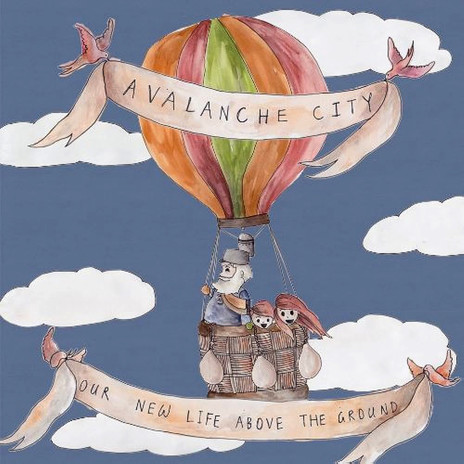

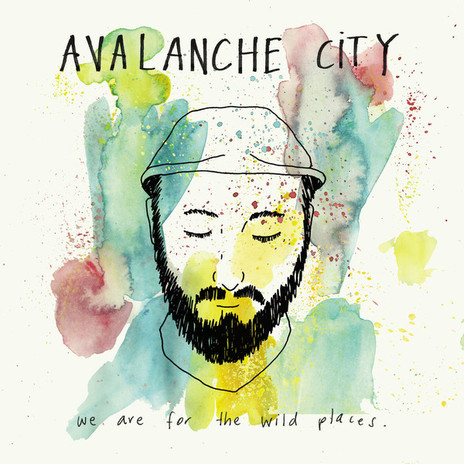
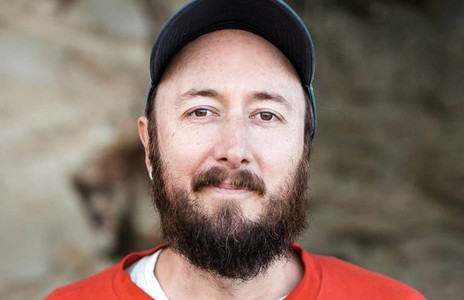
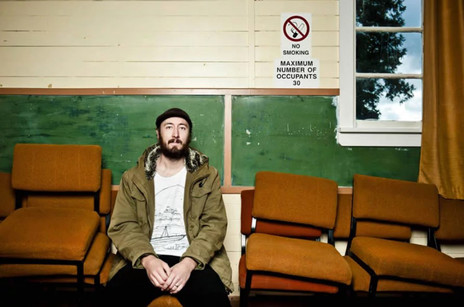
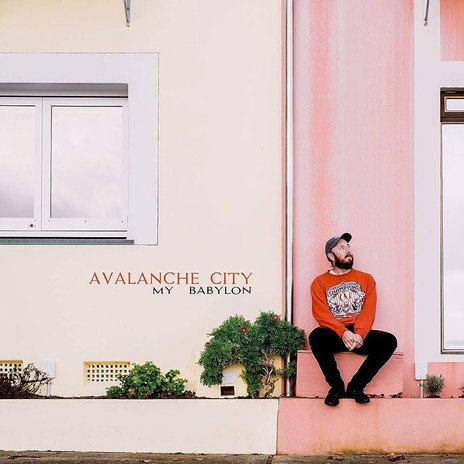
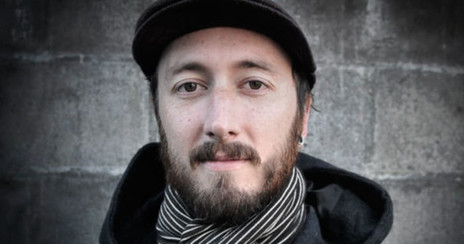
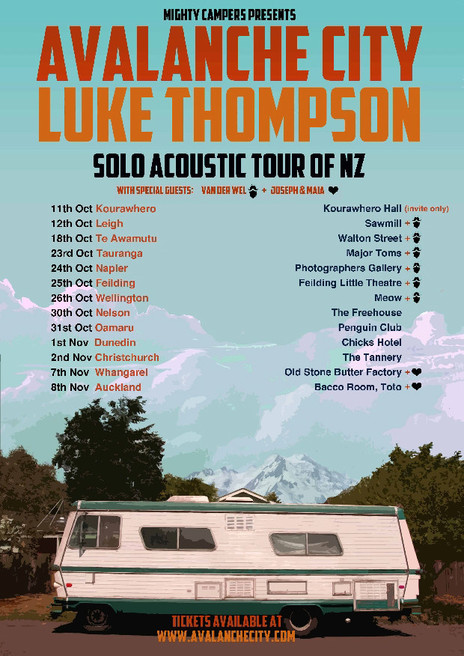
Warner Music
The Guacamole Farm
Avalanche City at MusicFeeds, 2011
Scenewave Australia interview, 2011
Diffuser: Avalanche City interview, 2012
Avalanche City at Elsewhere, 2015
Avalanche City: Stuff interview, 2015
Avalanche City: Tearaway interview, 2016
Siena Yates talks to Dave Baxter, 2016
Visit our sister site
NZ On ScreenMade with funding from
NZ On Air








